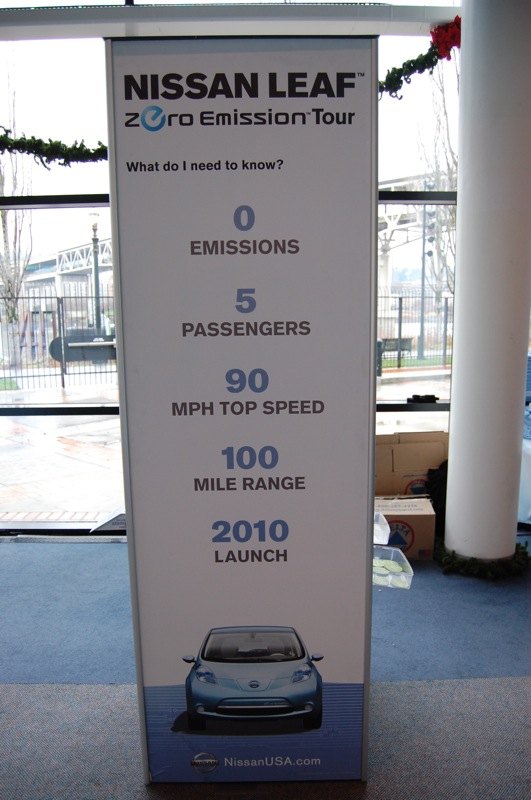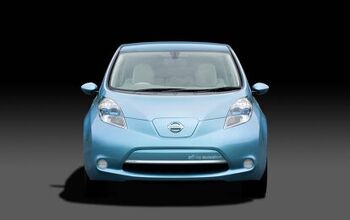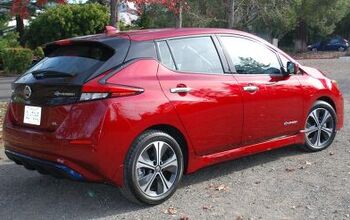How Much Will The Nissan Leaf Cost Anyway?
Nissan has had a $25k target pricetag on its forthcoming Leaf EV for some time now, as it’s built hype towards the car’s commercial rollout later this year. That price will be crucial in taking on GM’s Volt EREV, which is said to retail somewhere in the $40k ballpark but offers a range-extending gas engine. Allcarselectric.com got a little more detail out of Nissan execs, and reported back in November that
According to Brian Carolin, Nissan’s marketing executive for North America, the cost of the upcoming Leaf will be equivalent to the monthly cost of a fully loaded Honda Civic, plus the cost of its monthly fuel bill. To simplify pricing Carolin broke it down as such, “That means the purchase price (about $28,000) or comparable monthly payment for a high-end Civic plus the cost of the gasoline it would need to cover 1,200 miles (at 30 MPG and $3/gallon, about $120.”
Well maybe the words of Carolin are not easy to decipher. It appears as though he is trying to say that a Nissan Leaf will run about $120 more per month in payments if the vehicle is financed.
For example, if a fully loaded Honda Civic can be leased for $319 per month. Adding in a monthly fuel cost of $120 brings the total monthly out of pocket expense to $439. Nissan will either sell or lease the Leaf and its battery at that same price.
If that isn’t confusing enough, consider this: Nissan has just announced [via MarketWatch] that the Japanese-market Leaf will cost between 3.5m and 4m Yen ($38,661-$44,184). Of course, the US launch will coincide with US production at Nissan’s Smyrna facility, and that extra volume could help keep the price down. But will it really be $10k-$20k less than what the Japanese are being asked to pay? You’ll have to forgive us for being skeptical about that. Meanwhile, Nissan claims that 50k people have registered for ordering priority already (pre-orders begin in April), but they’re likely banking on a $25k price point. When real pricing comes out, it will be interesting to see how many of those folks actually sign up to buy the first mass-market EV on the American market.
More by Edward Niedermeyer
Latest Car Reviews
Read moreLatest Product Reviews
Read moreRecent Comments
- Redapple2 I think I ve been in 100 plants. ~ 20 in Mexico. ~10 Europe. Balance usa. About 1/2 nonunion. I supervised UAW skilled trades guys at GM Powertrain for 6 years. I know the answer.PS- you do know GM products - sales weighted - average about 40% USA-Canada Content.
- Jrhurren Unions and ownership need to work towards the common good together. Shawn Fain is a clown who would love to drive the companies out of business (or offshored) just to claim victory.
- Redapple2 Tadge will be replaced with a girl. Even thought -today- only 13% of engineer -newly granted BS are female. So, a Tadge level job takes ~~ 25 yrs of experience, I d look at % in 2000. I d bet it was lower. Not higher. 10%. (You cannot believe what % of top jobs at gm are women. @ 10%. Jeez.)
- Redapple2 .....styling has moved into [s]exotic car territory[/s] tortured over done origami land. There; I fixed it. C 7 is best looking.
- TheEndlessEnigma Of course they should unionize. US based automotive production component production and auto assembly plants with unionized memberships produce the highest quality products in the automotive sector. Just look at the high quality products produced by GM, Ford and Chrysler!


































Comments
Join the conversation
I have lived in a large urban environment for quite a while (recently moved out). I still have friends there that absolutely LOVE the idea of an electric city car since they sit in traffic so much. The problem is they have no place to plug this thing in -- they all park on the street. With an ICE car you only fear vandalism theft. With an electric card you'd have to rent a garage spot and get permission to use the electrical outlets. Common pricing is $100-$150/mo. Doesn't that eat up the advantages of not having to buy gasoline? Also: we have (in higher end/more expensive places) deeded parking spots. Is saving a few $ on gas worth shelling out $50-75k for a deeded parking spot? This spot may not even have an electrical outlet either....it just buys you parking! On top of this, it is not uncommon to have a week + with the temperature mostly below 0F (-17C). How do these batteries hold up at those temperatures? What happens when these people switch jobs & reverse commute on the highway to the suburbs for 1-2 hours & leave tons of accessories running (heater in the winter, music, lights, etc)? How does the TOTAL cost compare to: 1) public transport (Your car travelling in the same traffic as a bus isn't necessarily going to get you to your destination faster, and it will be slower than taking the train at rush hour) 2) A conventional ICE car I think there are still a lot of problems to be solved w/ electric cars, even for the "heavily urban" target market.
I'm certainly interested in an electric commuter; I'm afraid I'm going to have to replace my old Civic eventually. (By 'replace' I mean that my son will be driving in a few years and I'd rather let him use my 20 year old beater than anything nicer, which will leave me needing a way to get around). Even $28K is a bit more than I'd want to spend; I don't drive that many miles so I may have to wait for the technology to be refined and hope the price comes down sometime later. As for gas prices; all it takes is a couple of good GOM tropical storms to send us back to $4/gallon. It hasn't been THAT long since the gas lines in the South after Ike (less than 2 years) and the massive price spikes after Katrina/Rita (less than 5 years). Odds are good something will disrupt supply again soon and we'll be skirting $4/5 gas for a while before things get sorted out.